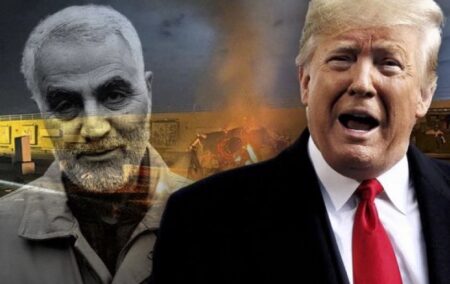Every year, astrologers and fortune tellers, drawing on supernatural powers, make this prediction for the New Year: “There’s going to be trouble in the Middle East.” For the last three thousand years they have been right – 2020 is no exception.
President Trump versus Iran has made us tremble. On January 3, he ordered the killing of Qasem Soleimani, head of Iran’s military (or “terrorist” if you like) Quds Force, at Baghdad Airport. Soleimani is believed to be responsible for deadly attacks against Americans and others all around the Middle East. It seems he was a bad man. But there are a lot of bad men in the Middle East and, while American presidents kill some of them, they suck up to others. The terrorists behind the 9/11 attack on New York came from Saudi not Iran. So why does the US grovel before Saudi but menace Iran? Why did the US not kill the head of the Saudi army?
Presidents Bush Jnr, Obama and Trump have killed, or caused to be killed, Saddam Hussein, Muammar Gaddafi and now Soleimani. The overthrow of the first two has been disastrous. They have been replaced by more dangerous and unstable regimes, which have spread terror and crushed Christian minorities. Another bad man, Bashar al-Assad, seems to have won a horrible war in Syria, thanks to Russian help. The lessons of the recent past suggest it’s best to leave him there, and not overthrow him too, as Hillary Clinton wants to do and Trump seems not to want to do.
I think Obama’s nuclear deal with Iran was excellent, pinning Iran down to tough inspection to make sure she couldn’t make nuclear weapons. Trump reneged on that deal, sullying the US’s reputation for honouring contracts, and increasing the chances of Iran’s getting nuclear weapons.
In his election campaign Trump promised – sort of – to withdraw the US from military adventures abroad. To some extent he’s done so, sometimes badly, as in removing troops protecting the Kurds. Trump has a habit of making bellicose noises and then backing off. In the case of Soleimani he had the man killed, and immediately backed off, not responding to Iran’s recent rather feeble (deliberately feeble I hope) retaliatory strikes. He says he does not want war against Iran or regime change. The Iranians don’t want war with the US either. Here is hope.
But there has also been a tragedy. Iranian missiles accidentally shot down an airliner flying from Iran to the Ukraine, killing all 176 passengers. They have admitted it and are contrite. Trump has reacted calmly. It might actually have a sobering effect on the conflict.
In the US itself, the political response to the killing of Soleimani has been fairly sensible despite some silliness – from Elizabeth Warren, for example. Some “Conservative” commentators, notably Tucker Carlson of Fox News, condemned it (he asked what good could come from it) while some “Progressive” commentators on CNN supported it. Rand Paul, my favourite Republican, and Tulsi Gabbard, my favourite Democrat, both condemned it.
History can give us false messages. In WW2, America, mainly for moral reasons, helped to defeat Nazi Germany and gangster Japan, and was brilliantly successful in turning both into thriving democracies. Is the lesson that America can always use military force to bring democracy and happiness? Unfortunately not, as we have seen in the Middle East and other regions.
The other false message is over the “appeasement” of Hitler. It is argued, accurately, that appeasement encouraged Hitler. From 1933 to 1938, Hitler could easily have been stopped by military action from the Western democracies or even by the serious threat of military action in 1936 when Hitler invaded the Rhineland. Instead the French gave way and Hitler, encouraged and emboldened, grew stronger and angrier. But the President of Iran is no Hitler either, and so the Hitlerian arguments about appeasement and deterrence don’t make much sense.
Towering above all other antagonisms in the Middle East is the conflict between Sunnis and Shiites. It has been seething for 14 centuries. It is the overwhelming reason for the hostility between Saudi and Iran for which everything else, including Israel and the West, is a side show. Few people in the West seem to grasp this but it explains almost everything.
What to do in the Middle East? I’ve got no grand solutions, but just want the US to stop unnecessary military intervention, withdraw military forces responsibly, deal with all parties fairly, trade with everyone and use diplomacy as the primary tool of foreign policy.
The views of the writer are not necessarily the views of the Daily Friend or the IRR
If you like what you have just read, become a Friend of the IRR if you aren’t already one by SMSing your name to 32823 or clicking here. Each SMS costs R1. Terms & Conditions Apply.

